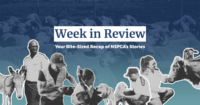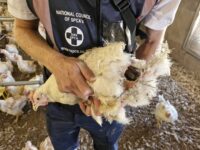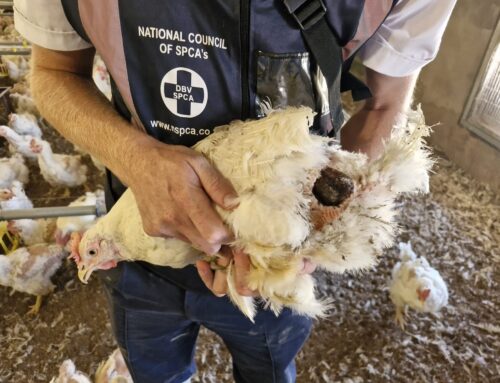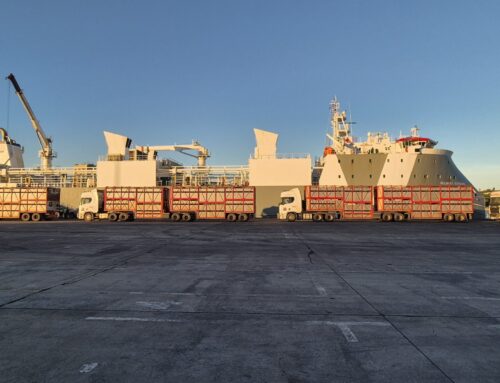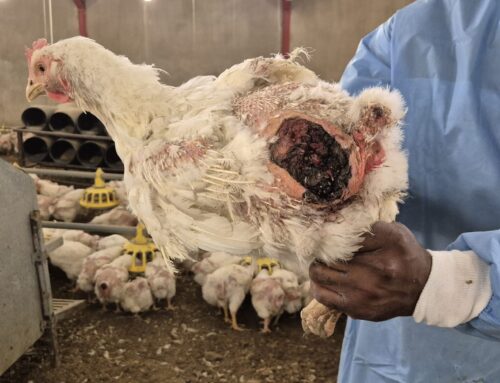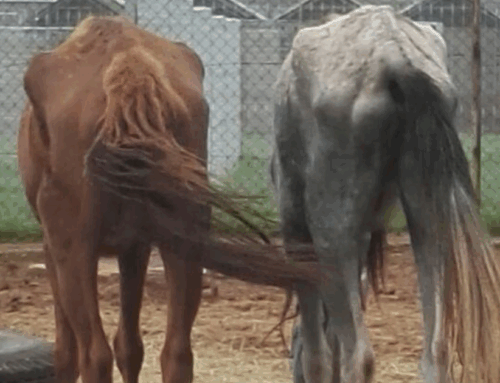The National Council of SPCAs (NSPCAs) observed gross cruelty towards the sheep being loaded on the Al Messilah vessel, owned by Al Mawashi and KLTT. Some of the issues seen were inhumane and cruel handling, unacceptable levels of noxious gases and noise, and overloading.
The NSPCA Inspectors observed numerous contraventions of the Animals Protection Act No 71 of 1962. These contraventions included; animals legs caught between trucks and ramps, dragging of the sheep by the fleece, legs and horns, punching and kicking, tail twisting, knee jabbing into the ribs of animals, and grabbing and tossing of animals.
More than 50 % of the sheep were not afforded adequate space and pens were over-crowded. At this time of the year with expected high temperatures, this kind of stocking density is unacceptable, especially for the overweight animals.
Six newborn lambs were discovered on board the vessel, with more likely to be born in the coming days. The majority of sheep had not been sheared. These are all contraventions of the OIE Standards.
Judge Dukada ordered that Al Mawashi and KLTT are required to adhere to these OIE Standards and that the Department of Agriculture, Land Reform and Rural Development are required to monitor and ensure compliance. Although the NSPCA pointed out the blatant contraventions, the exporters were still allowed to load the sheep.
On the vessel, ammonia levels were rising, and the animals had not been adapted to the feed. Al Mawashi’s in house veterinarian submitted an affidavit that all animals need to be off roughage seven days before loading, recognising the OIE’s stipulation on feed adaption. The animals were fed roughage right up until loading.
Overweight animals, heavily wooled animals, and injured animals were loaded. Excessive noise levels were recorded on most of the decks – the animals are exposed to this level of noise for the entire journey.
“South Africa is one of the few countries in the world where our Constitutional Court recognises animals as sentient beings. It is a disservice to this recognition, and to the animals, when standards like the OIE standards, which was written for countries that do not have animal protection legislation, are given more reverence than our strong animal protection legislation. And then the exporters do not even adhere to these basic standards – live export in this manner leads to criminal offences, and it should be treated as such,” said Marcelle Meredith, NSPCA Executive Director.
The NSPCA has laid charges in terms of the Animals Protection Act No 71 of 1962 and will continue to fight for the ban of live export of sheep by sea over the equator.
If you are as passionate about animals and their well-being as we are, consider supporting our causes by donating.
Latest News Posts
Will You Be the One Who Takes Action?
Most people will scroll past this. But will you be the one who stands up for animals?
Animal welfare isn’t always in the spotlight, but it changes lives – for every neglected, abused, or suffering animal we help. Our teams work tirelessly, often behind the scenes, ensuring animals across South Africa are protected.
This work is relentless. The challenges are immense. But with more hands, hearts, and resources, we can do even more.
The equation is simple: the more supporters we have, the greater our reach, the stronger our impact.
Be part of the change. Become an NSPCA Project Partner today. From just R50 per month, you can help ensure that no animal suffers in silence.

